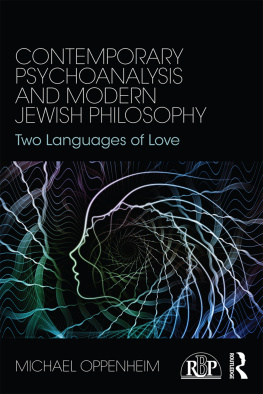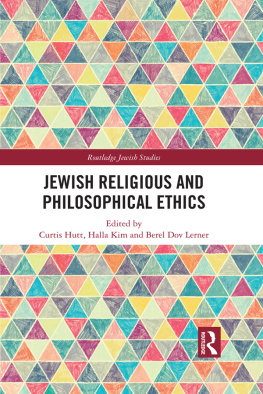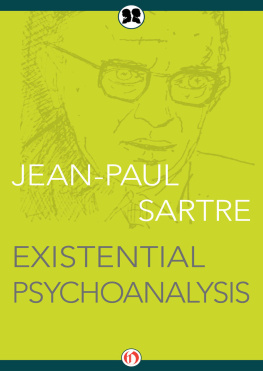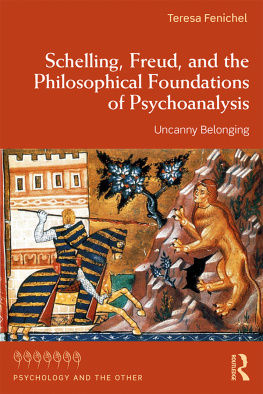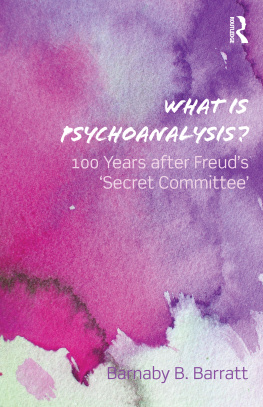Contemporary Psychoanalysis and Modern Jewish Philosophy
Relational psychoanalysis and modern Jewish philosophy have much to say about the dynamics of human relationships, but there has been no detailed, thorough, and constructive examination that brings together these two incisive discourses. Contemporary Psychoanalysis and Modern Jewish Philosophy: Two Languages of Love explores the critical similarities and differences between the two disciplines, casting new light on both the analytic and philosophical understandings of how relationships develop, flourish, and fail.
For psychoanalysts such as Hans Loewald, Stephen Mitchell, and Jessica Benjamin, love is seen as a fundamental life force, a key to human motivation, and the transformative core of Freuds therapeutic talking cure. The Jewish philosophers Franz Rosenzweig, Martin Buber, and Emmanuel Levinas envision love as having both a human and divine dimension, expressed through the dual commandments to love God and the neighbor. The two languages are brought to life through chapters that investigate: the relationship between self-love and love of the other, the dynamics of intersubjectivity, the methods and possibilities of human transformation, the magical powers of language, the goal of achieving a meaningful life, the significance of responsibility for others, and the challenge that death poses to lifes fullness.
This multidisciplinary study, drawing on psychology, philosophy, religion, and feminism, provides an important contribution to contemporary scientific and humanistic interest in the social and relational dimensions of human living. The book will appeal especially to clinicians, theorists, and scholars of psychoanalysis, philosophy of religion, and Jewish studies as well as advanced students studying in these fields.
Michael Oppenheim is Professor Emeritus in the Department of Religion at Concordia University, Montreal. His books include Speaking/Writing of God (1997), Jewish Philosophy and Psychoanalysis (2006), and Encounters of Consequence (2009).

The Relational Perspectives Book Series (RPBS) publishes books that grow out of or contribute to the relational tradition in contemporary psychoanalysis. The term relational psychoanalysis was first used by Greenberg and Mitchell to bridge the traditions of interpersonal relations, as developed within interpersonal psychoanalysis and object relations, as developed within contemporary British theory. But, under the seminal work of the late Stephen A. Mitchell, the term relational psychoanalysis grew and began to accrue to itself many other influences and developments. Various tributariesinterpersonal psychoanalysis, object relations theory, self psychology, empirical infancy research, and elements of contemporary Freudian and Kleinian thoughtflow into this tradition, which understands relational configurations between self and others, both real and fantasied, as the primary subject of psychoanalytic investigation.
We refer to the relational tradition, rather than to a relational school, to highlight that we are identifying a trend, a tendency within contemporary psychoanalysis, not a more formally organized or coherent school or system of beliefs. Our use of the term relational signifies a dimension of theory and practice that has become salient across the wide spectrum of contemporary psychoanalysis. Now under the editorial supervision of Lewis Aron and Adrienne Harris, with the assistance of Associate Editors Steven Kuchuck and Eyal Rozmarin, the Relational Perspectives Book Series originated in 1990 under the editorial eye of the late Stephen A. Mitchell. Mitchell was the most prolific and influential of the originators of the relational tradition. Committed to dialogue among psychoanalysts, he abhorred the authoritarianism that dictated adherence to a rigid set of beliefs or technical restrictions. He championed open discussion, comparative and integrative approaches, and promoted new voices across the generations.
Included in the Relational Perspectives Book Series are authors and works that come from within the relational tradition, extend and develop that tradition, as well as works that critique relational approaches or compare and contrast it with alternative points of view. The series includes our most distinguished senior psychoanalysts, along with younger contributors who bring fresh vision. For a full list of all the titles in the series, please visit the Routledge website.
Recent titles in this series:
Vol. 84 The Neuropsychodynamic Treatment of Self-Deficits: Searching for Complementarity
Joseph Palombo
Vol. 83 Trans-generational Trauma and the Other: Dialogues Across History and Difference
Edited by Sue Grand and Jill Salberg
Vol. 82 Wounds of History: Repair and Resilience in the Trans-generational Transmission of Trauma
Edited by Jill Salberg and Sue Grand
Vol. 81 Body-Mind Dissociation in Psychoanalysis: Development after Bion
Riccardo Lombardi
Vol. 80 Psychoanalysis, Trauma and Community: History and Contemporary Reappraisals
Edited by Judith L. Alpert and Elizabeth R. Goren
Vol. 79 Contemporary Psychoanalysis and Modern Jewish Philosophy : Two Languages of Love
Michael Oppenheim
Vol. 78 Talking About Evil: Psychoanalytic, Social, and Cultural Perspectives
Edited by Rina Lazar
Greenberg, J. & Mitchell, S. (1983). Object relations in psychoanalytic theory. Cambridge, MA: Harvard University Press.
Contemporary Psychoanalysis and Modern Jewish Philosophy
Two Languages of Love
Michael Oppenheim

First published 2017
by Routledge
2 Park Square, Milton Park, Abingdon, Oxon OX14 4RN
and by Routledge
711 Third Avenue, New York, NY 10017
Routledge is an imprint of the Taylor & Francis Group, an informa business
2017 Michael Oppenheim
The right of Michael Oppenheim to be identified as author of this work has been asserted by him in accordance with sections 77 and 78 of the Copyright, Designs and Patents Act 1988.
All rights reserved. No part of this book may be reprinted or reproduced or utilised in any form or by any electronic, mechanical, or other means, now known or hereafter invented, including photocopying and recording, or in any information storage or retrieval system, without permission in writing from the publishers.
Trademark notice : Product or corporate names may be trademarks or registered trademarks, and are used only for identification and explanation without intent to infringe.
British Library Cataloguing in Publication Data
A catalogue record for this book is available from the British Library
Library of Congress Cataloging in Publication Data
Names: Oppenheim, Michael D., 1946- author.
Title: Two languages of love: contemporary psychoanalysis and modern Jewish philosophy/Michael Oppenheim.
Description: Abingdon, Oxon; New York, NY: Routledge, 2017. | Includes bibliographical references and index.
Identifiers: LCCN 2016015993 | ISBN 9781138119420 (hardback: alk. paper) | ISBN 9781138119437 (pbk.: alk. paper) | ISBN 9781315652320 (e-book: alk. paper)
Subjects: LCSH: Jewish philosophy. | Judaism and psychoanalysis. | Psychoanalysis and philosophy. | LovePhilosophy.
Classification: LCC B5802 .P75 O673 2017 | DDC 181/.06dc23
LC record available at https://lccn.loc.gov/2016015993
ISBN: 978-1-138-11942-0 (hbk)
ISBN: 978-1-138-11943-7 (pbk)
ISBN: 978-1-315-65232-0 (ebk)
Typeset in Times New Roman
Next page
